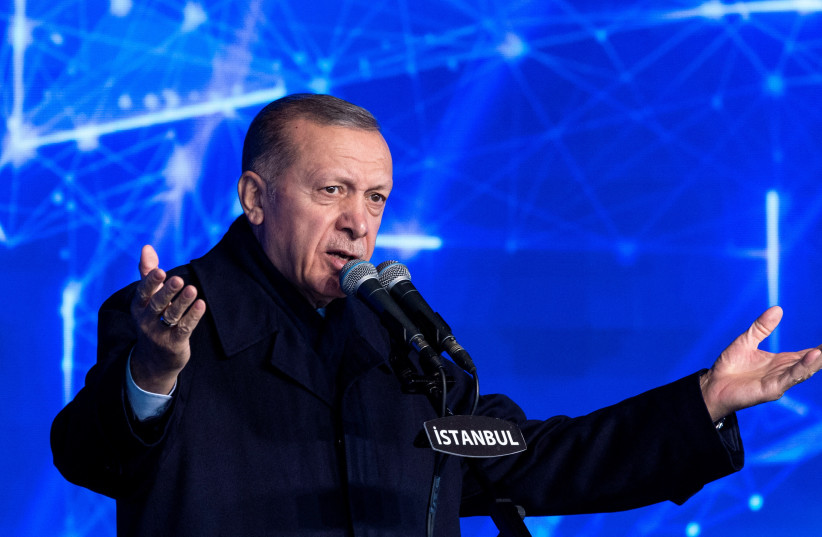Turkish President Recep Tayyip Erdogan condemned the US ambassador to Turkey for meeting with the main opposition alliance’s presidential candidate less than two months ahead of tightly contested national elections.
For more stories from The Media Line go to themedialine.org
The US embassy in Ankara posted a photograph of Ambassador Jeffery Flake meeting with the Republican People’s Party’s (CHP) Kemal Kilicdaroglu last week, and reported that they spoke about “issues of mutual interest” to their countries.
During a ceremony to mark the opening of public buildings, Erdogan said that the ambassador’s job is to deal directly with the president and that “we need to teach America a lesson” in these elections, the Turkish state news agency reported on Monday.
“Our doors are closed to him,” Erdogan said of Flake.
Turkey's incoming elections
Turkish voters will cast ballots in presidential and parliamentary elections on May 14 with several polls suggesting Kilicdaroglu, the presidential candidate of an opposition alliance of six parties, has a significant chance of beating Erdogan after 20 years in power.

Nicholas Danforth, a non-resident fellow at the Hellenic Foundation for European and Foreign Policy, who focuses on Turkey, said the Flake meeting was standard diplomatic procedure.
“In meeting with him, they’re trying to send a signal that the United States is watching this election, takes democratic elections seriously, wants to see a fair result rather than giving the message that we are throwing America’s weight behind the opposition.”
Nicholas Danforth
“In meeting with him, they’re trying to send a signal that the United States is watching this election, takes democratic elections seriously, wants to see a fair result rather than giving the message that we are throwing America’s weight behind the opposition,” Danforth told The Media Line.
Aydin Sezer, an Ankara-based foreign policy analyst, told The Media Line he believes the meeting was part of ordinary contact between the US government and opposition parties.
Before US President Joe Biden won the 2020 election, he told The New York Times that the US should engage with and back the opposition in Turkey.
“We can support those elements of the Turkish leadership that still exist and get more from them and embolden them to be able to take on and defeat Erdogan,” he said, adding that he was referring to the electoral process and not a coup.
Relations between the US and Turkey have been severely strained for years over several issues, including Ankara’s purchase of a Russian anti-missile air defense system, the S-400.
Analysts saw the deal as symbolic of Turkey’s attempt to decrease its dependence on Western allies and move toward a more independent geopolitical position.
As punishment, Ankara was kicked out of the F-35 fighter jet program and, with its aging fleet of military aircraft, it has pushed to buy F-16 jets instead.
That has so far been unsuccessful.
Sezer said the F-35s, a superior jet to the F-16s, are incredibly important to Turkey because it had a role in developing the aircraft.
He added that the CHP would strengthen relations with the US and the West if it won the elections in order to improve the country’s economy amid a dire financial situation that has seen skyrocketing inflation.
“Turkey is a long-time ally of the West, member of NATO and [has] custom union relations with the European Union. Relations with the West in general will be the primary focus, we can be sure of that,” Sezer said.
Another major sticking point in relations is Washington’s cooperation with the Kurdish fighters in Syria that Ankara says are connected to a militia inside Turkey, the Kurdistan Workers’ Party (PKK).
Turkey, the US and the European Union classify the PKK as a terrorist organization.
Sezer believes that the CHP will initiate a rapprochement with Kurdish groups in Turkey which would have ramifications in Syria.
Danforth thinks that both the US and Turkey would work hard to build a stronger relationship and expects compromises on some key issues to be made quickly, such as the S-400s, which could give Ankara access to fighter jets.
“If the opposition won, it would be met with an outpouring of good will from Washington and European capitals,” Danforth said.
He added that the CHP will likely continue to push for more independent geopolitical policies, but ones that the government would believe are in the interest of Turkey.
However, he does not believe that Ankara would launch new sanctions on Russia, after Turkey’s allies in the West imposed their own.
“It’s not like problems are going to go away overnight. But I think you’ll have a government that’s more interested and capable of managing those problems effectively,” he said.
